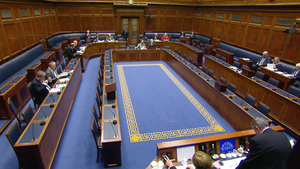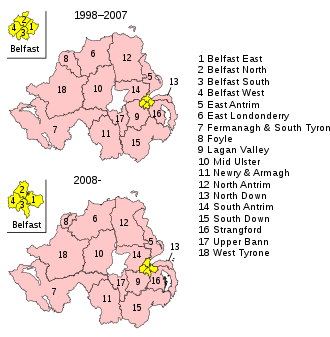Northern Ireland Assembly
The Northern Ireland Assembly (Irish: Tionól Thuaisceart Éireann; Scots: Norlin Airlann Semmlie) is the parliament for the British part of Northern Ireland. It has wide-ranging legislative powers in areas not specifically reserved for the British Parliament. In addition, the Assembly elects the government of Northern Ireland. It is based in Belfast and meets in the Stormont district.
The current Parliament was created by the Good Friday Agreement of 1998, which was intended to end thirty years of conflict in Northern Ireland. It is based on the principle of concordance to ensure that Northern Ireland's two largest political groups, the Protestant Unionists and the Catholic Nationalists, participate in government. It is a unicameral parliament with 90 members. The election is by single transferable vote in the sense of proportional representation.
The Assembly has been suspended on a number of occasions, most recently from October 2002 until May 2007, during which time its powers were transferred to the Department of Northern Ireland. Under the St Andrews Agreement of November 2006, new elections were held in March 2007 and the Assembly's powers were restored.
Following a scandal over the Renewable Heat Incentive, the previous First Minister Martin McGuinness resigned as Deputy First Minister in early 2017, which, with his Sinn Féin party failing to provide a replacement, led to a new election in March 2017. However, as the Unionists (DUP) now no longer had an absolute majority in the Assembly, and they were unable to reach agreement with the opposition (Sinn Féin) on a number of issues (including same-sex marriage in Northern Ireland and an official language status in Northern Ireland for the Irish language), a new Executive could not be established, leaving the Assembly unable to act. The budget for Northern Ireland was passed as a substitute by the all-UK government in London in November 2017. Further talks between the DUP and Sinn Féin, with the support of Prime Minister Theresa May and Irish Taoiseach Leo Varadkar, have so far failed to produce any result, although the British and Irish governments promised to "intensify" negotiations in May 2019. On 21 October 2019, DUP and some SDLP MPs returned to the Assembly after 1008 days to symbolically debate a bill on the "protection of unborn life", but for procedural reasons the Assembly adjourned after less than an hour without passing a resolution.
The poor showing for both the DUP and Sinn Féin in the 2019 British House of Commons election was seen as a reaction from voters for years of political gridlock. New impetus for a fresh start came from the British government's offer to invest an additional £2 billion in the province's health system and infrastructure. Moreover, in January 2020, the Irish and British prime ministers came to the unanimous decision that the only way to resolve a continuing deadlock was to hold new elections in the near future. As a result of this, the leading Northern Ireland parties reached an agreement on 11 January 2020 to continue working in the regional parliament. Arlene Foster was reappointed as First Minister, with Michelle O'Neill as her deputy.
History
Predecessor
There have been several regional governments in Northern Ireland in recent history, the first being formed in 1921 under the Government of Ireland Act. Parts of Ulster were granted autonomous government after the partition of Ireland (Home Rule), while the Irish Free State was established on the rest of the island. From June 1921 until March 1972 the Parliament of Northern Ireland existed as a legislative body and was divided into two chambers. It was a first-past-the-post system and the boundaries of the constituencies were adjusted in such a way that the Catholics, who were already in the minority, were further disadvantaged (gerrymandering). As a result, this Parliament was dominated by the Protestant UUP, which was also constantly in government during this period. The parliament was suspended in March 1972 after Bloody Sunday and finally dissolved in 1973.
Shortly after the abolition of this first parliament, calls were made to restore Home Rule, sharing power between Unionists and Nationalists. An Assembly created after the Sunningdale Agreement in 1973, already called the Northern Ireland Assembly, was abolished just a year later because radicals from both sides opposed it. In 1982 another Assembly was set up, a body with few powers, which was dissolved again in 1986 because of the low level of support from the Catholic side.
The modern assembly
The modern Northern Ireland Assembly was first elected on 25 June 1998 as part of the implementation of the Good Friday Agreement and held its first sitting on 1 July of that year. All parties in Northern Ireland who supported the Agreement and pledged to renounce violence were given equal representation in the Assembly. However, the Assembly existed only "in the shadows" until 2 December 1999, as it was only then that the Assembly was given its functions. Since then, the parliament has been temporarily dissolved several times by the British government:
- 11 February 2000 to 30 May 2000
- August 10, 2001
- 12 September 2001
- 14 October 2002 until 7 May 2007
The work of the Assembly was repeatedly hampered by the conflict between the Protestant parties on the one side and the Catholic Sinn Fein allied with the IRA on the other. The main accusation was that the paramilitary IRA had not yet fully disarmed and renounced violence. The last and longest suspension of the Assembly came after allegations that Sinn Fein staff were spying for the IRA and UUP ministers resigned over it. In November 2006, members of the Assembly met once again to be involved in the St Andrews Agreement. As a result of this agreement, new elections were held on 7 March 2007 and self-government was restored on 26 March when MPs met.
In 2016, the number of MPs for future elections was reduced by law from 108 to 90. Since then, 5 MPs have been elected in each of the 18 constituencies instead of 6. This regulation was applied for the first time in the 2017 election.
In May 2019, the governments of the UK and Ireland agreed to "intensify" negotiations on the reinstatement of the Assembly. No specific timeframe was given. Northern Ireland party leaders met several times at Parliament House in Stormont until mid-June, and five working groups were also set up to resolve individual issues. Since then, no rapprochement has been announced.
In the fall of 2019, the Catholic bishops of All Ireland appealed to the Assembly to reconvene no later than October 21, 2019, to prevent the liberalization of abortion rights in Northern Ireland. The House of Commons in London had passed corresponding amendments to the law. However, the competent Supreme Court of Northern Ireland, the High Court in Belfast, had previously ruled that the strict ban on abortion in Northern Ireland, which was previously in force, violated the European Convention on Human Rights. On 21 December, after 1008 days, DUP and SDLP MPs returned to the Assembly to debate a DUP bill against the liberalisation of abortion rights, but because the republican SDLP left the chamber and the other groups did not turn up, a new Speaker could not be elected and the session was adjourned after less than an hour. The DUP's Robin Newton, still in office as Speaker, had refused to change the Assembly's procedural rules to allow a resolution to be passed, despite massive pressure from his party. He insisted that a Speaker must be elected who has the confidence of both Unionists and Republicans before parliamentary deliberations. As a result, a new, defused abortion law came into force in Northern Ireland at 00.00 on 22 October 2019, and same-sex couples will also be able to marry there for the first time from February 2020.
In the event of Brexit, British Prime Minister Boris Johnson wanted to grant the Assembly the right to decide whether Northern Ireland should remain in a customs union with the European Union after a transition period of 14 months and every four years thereafter. Even before its final failure, the plan was highly controversial because it did not make clear how the regional parliament's ability to function was to be restored.

Northern Ireland Assembly Chamber

The constituency divisions for the Northern Ireland Assembly follow the constituency boundaries for the Westminster Parliament. The boundaries of the 18 constituencies were partly redrawn in 2008.
Distribution of seats of the parties
The composition and powers of the Assembly are set out in the Northern Ireland Act. The 90 members (108 until 2016) are elected in 18 constituencies of five. The constituencies are the same as those for the election of the House of Commons. After each election the Assembly must meet within eight days. It can dissolve itself by a two-thirds majority. It is automatically dissolved if it fails to elect a head of government within six weeks. Elections are called by the Northern Ireland Secretary. Each member must sign up to one of three groups "Unionist", "Nationalist" or "Other" at the start of the term. A member may change groups no more than once per term. Currently there are 40 Unionists, 39 Nationalists and 11 Others in the Assembly.
| Logo | Party | Orientation | Seats | |||
| post-election | Current | +/− | ||||
|
|
| Democratic Unionist Party (DUP) | Unionists | 28 | 27 | ▼1 |
|
|
| Sinn Féin (SF) | Nationalists | 27 | 26 | ▼1 |
|
|
| Social Democratic and Labour Party (SDLP) | Nationalists | 12 | 12 | |
|
|
| Ulster Unionist Party (UUP) | Unionists | 10 | 10 | |
|
|
| Alliance Party (Alliance) | Other | 08 | 07 | ▼1 |
|
|
| Green Party in Northern Ireland (GPNI) | Other | 02 | 02 | |
|
| Traditional Unionist Voice (TUV) | Unionists | 01 | 01 | ||
|
|
| People Before Profit (PBP) | Other | 01 | 01 | |
|
| Independent | Unionists | 01 | 02 | ▲1 | |
|
| Independent | Other | - — | 01 | ▲1 | |
|
| Speaker | - — | - — | 01 | ▲1 | |
| Total | 90 | 90 | ||||
The party landscape in Northern Ireland is traditionally sectarian. The established British parties such as the Conservative Party, the Labour Party and the Liberal Democrats play no role there and (with the exception of the Conservatives) do not put up candidates for elections.
Search within the encyclopedia
